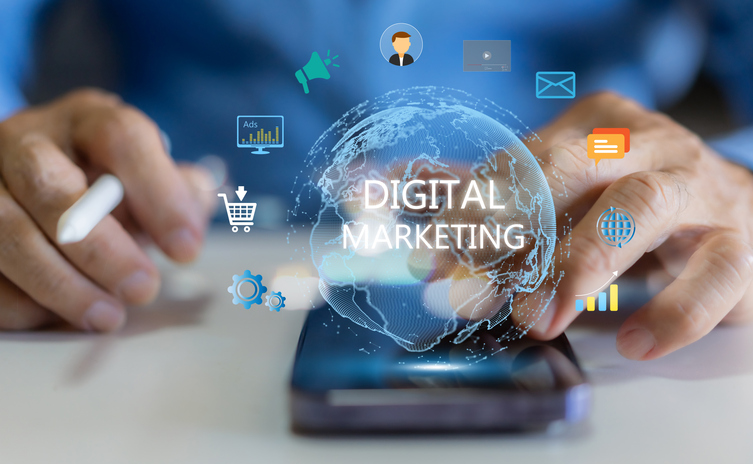4 min read
Mastering Digital Marketing: Boost Your Skills with Online Classes!
Digital Marketing Classes: The Ultimate Guide to a Thriving Career In today's internet-dominated world, businesses are seeking ways to leverage...
5 min read
![]() The Amazing Team at Focus Digital Marketing
:
May 3, 2024 1:02:01 PM
The Amazing Team at Focus Digital Marketing
:
May 3, 2024 1:02:01 PM
Stay ahead of the curve in the ever-evolving digital marketing industry by exploring the latest trends and opportunities for career growth.
In the dynamic and competitive world of digital marketing, businesses need to constantly find ways to maximize their impact and stay ahead of the competition. One of the key strategies to achieve this is through innovation. By thinking outside the box and coming up with creative and unique approaches, businesses can differentiate themselves and capture the attention of their target audience.
Innovative strategies can help businesses stand out in the crowded digital landscape, increase brand awareness, and ultimately drive business growth. This can be achieved through various means, such as creating engaging and interactive content, leveraging emerging technologies, and adopting new marketing channels and platforms.
By embracing innovation, businesses can unlock new opportunities and reach new heights in terms of market reach and online presence. It allows them to connect with their target audience in meaningful ways, build strong relationships, and drive conversions and sales. In a rapidly evolving digital marketing landscape, the ability to innovate is crucial for businesses to stay relevant and thrive.
The digital marketing industry is constantly evolving, and one of the key drivers of this evolution is emerging technologies. As new technologies emerge, marketers need to stay updated and adapt their strategies accordingly to leverage these advancements.
From artificial intelligence and machine learning to virtual reality and augmented reality, emerging technologies are reshaping the way businesses connect with their audience and deliver their message. Marketers who embrace these technologies and find innovative ways to incorporate them into their digital marketing campaigns can gain a competitive edge and achieve remarkable results.
Adapting to emerging technologies not only allows businesses to stay ahead of the curve but also enables them to provide enhanced customer experiences. For example, the use of chatbots powered by artificial intelligence can improve customer service and streamline the buying process. Virtual reality experiences can allow customers to visualize products before making a purchase, enhancing their confidence and reducing the likelihood of returns.
By keeping a close eye on emerging technologies and experimenting with their application in digital marketing, businesses can stay relevant and position themselves as industry leaders. It opens up new avenues for creativity and innovation, enabling marketers to connect with their audience in exciting and impactful ways.
Data analytics has become an integral part of digital marketing strategies, allowing businesses to make data-driven decisions and optimize their marketing efforts. By harnessing the power of data, marketers can gain valuable insights into their target audience, identify trends, and measure the effectiveness of their campaigns.
Data analytics enables businesses to understand customer behavior, preferences, and needs on a deeper level. By analyzing data from various sources, such as website analytics, social media platforms, and customer relationship management systems, marketers can identify patterns and trends that can inform their marketing strategies.
Furthermore, data analytics can help businesses personalize their marketing efforts and deliver highly targeted messages to their audience. By segmenting their audience based on demographics, behavior, and preferences, marketers can create tailored campaigns that resonate with their target market and drive engagement and conversions.
In addition to improving marketing effectiveness, data analytics can also provide insights into market trends and industry benchmarks. By analyzing industry data and monitoring competitor strategies, businesses can stay informed about the latest trends and adapt their marketing strategies accordingly.
Overall, harnessing the power of data analytics is essential for businesses to stay competitive in the digital marketing landscape. It allows them to make informed decisions, optimize their marketing efforts, and deliver personalized experiences that drive results.
In today's digital age, customers expect personalized experiences and interactions with brands. Personalization is no longer just a nice-to-have; it has become a key driver of customer satisfaction and loyalty. Marketers who prioritize personalization in their digital marketing strategies can create meaningful connections with their audience and enhance the overall customer experience.
Personalization can be achieved through various means, such as personalized email marketing campaigns, dynamic website content, and targeted social media advertising. By leveraging customer data and segmentation, marketers can deliver relevant and tailored messages to their audience, increasing engagement and conversions.
Moreover, personalization extends beyond just delivering personalized content. It also involves providing a seamless and frictionless customer experience across all touchpoints. From the initial interaction with a brand to the post-purchase support, every step of the customer journey should be personalized and optimized to meet the customer's needs and expectations.
By focusing on personalization and customer experience, businesses can build strong relationships with their customers, foster loyalty, and drive repeat business. It allows them to stand out in a crowded marketplace and differentiate themselves from competitors.
In conclusion, personalization and customer experience are key trends in the digital marketing industry. By prioritizing these aspects in their strategies, businesses can create memorable experiences for their customers and achieve long-term success.
Influencer marketing has gained significant traction in recent years and has become a prominent trend in the digital marketing industry. Influencers, who are individuals with a large following and influence on social media platforms, have the power to sway the opinions and purchasing decisions of their audience.
By partnering with influencers, businesses can tap into their existing audience and leverage their credibility and influence to promote their products or services. This form of marketing can be highly effective, as it allows businesses to reach a wide and engaged audience that trusts the recommendations of the influencer.
Influencer marketing can take various forms, such as sponsored content, product reviews, and influencer takeovers. The key is to find influencers whose values align with the brand and whose audience matches the target market.
However, it is important to approach influencer marketing strategically and authentically. Consumers are becoming more discerning and can easily spot inauthentic endorsements. Businesses should focus on building genuine relationships with influencers and creating partnerships that provide mutual value.
The rise of influencer marketing presents exciting opportunities for businesses to expand their reach and connect with their target audience in a more authentic and engaging way. By carefully selecting influencers and crafting compelling campaigns, businesses can leverage the power of influencer marketing to drive brand awareness, increase conversions, and achieve business growth.
Staying up to date with the latest industry trends is crucial for professionals in the digital marketing industry. The landscape is constantly evolving, and new trends emerge regularly. By staying informed about industry trends, professionals can adapt their skills, strategies, and approaches to stay relevant and competitive.
Some of the current industry trends include the rise of video marketing, the growing importance of social media advertising, the increasing use of chatbots for customer service, and the emphasis on mobile optimization. Professionals should familiarize themselves with these trends and explore how they can incorporate them into their digital marketing strategies.
Attending industry conferences, following industry thought leaders, and participating in online communities can be great ways to stay updated about the latest trends and best practices. Additionally, continuous learning and skill development through courses and certifications can help professionals stay ahead of the curve and enhance their career prospects.
By staying informed about industry trends and proactively adapting to changes, professionals in the digital marketing industry can position themselves as experts and valuable assets to their organizations.
In conclusion, staying updated about industry trends is essential for professionals in the digital marketing industry. It allows them to stay competitive, enhance their skills, and seize new opportunities for career growth.
As sustainability and social responsibility become increasingly important to consumers, businesses need to incorporate these values into their digital marketing strategies. Consumers are increasingly conscious of the environmental and social impact of the brands they support, and they expect businesses to act responsibly.
Digital marketing can play a crucial role in communicating a brand's sustainability efforts and social responsibility initiatives. By highlighting these aspects in their marketing campaigns, businesses can connect with socially conscious consumers and differentiate themselves from competitors.
Some ways businesses can incorporate sustainability and social responsibility into their digital marketing strategies include promoting eco-friendly and sustainable products, supporting charitable causes, and adopting ethical business practices. By aligning their brand with these values, businesses can attract like-minded customers and build a loyal customer base.
Moreover, businesses can leverage digital marketing channels to raise awareness about social and environmental issues and inspire action. Social media platforms can be powerful tools for spreading awareness and mobilizing communities around important causes.
By embracing sustainability and social responsibility in their digital marketing strategies, businesses can not only make a positive impact but also build a strong brand reputation and attract customers who share their values.
Also Read: What Does A Digital Marketer Do In A Workday?
For more insights and resources on digital marketing strategies, visit Focus Digital Marketing.
FAQs:
What role does innovation play in digital marketing?
Innovation helps businesses stand out, increase brand awareness, and drive growth by leveraging unique strategies and emerging technologies.
Why is adapting to emerging technologies important in digital marketing?
Staying current with technologies like AI and VR allows marketers to offer enhanced customer experiences and maintain a competitive edge.
How does data analytics impact digital marketing strategies?
Data analytics provides insights into customer behavior and preferences, enabling personalized marketing and more effective campaigns.
What is the significance of personalization in digital marketing?
Personalization enhances customer experiences and satisfaction, leading to increased loyalty and sales.
What is influencer marketing and why is it effective?
Influencer marketing involves partnering with social media influencers to leverage their credibility and audience, effectively boosting brand visibility and trust.

4 min read
Digital Marketing Classes: The Ultimate Guide to a Thriving Career In today's internet-dominated world, businesses are seeking ways to leverage...

9 min read
Exploring the Evolution of Digital Marketing Digital marketing has come a long way since its inception. In the eaZarly days of the internet,...

3 min read